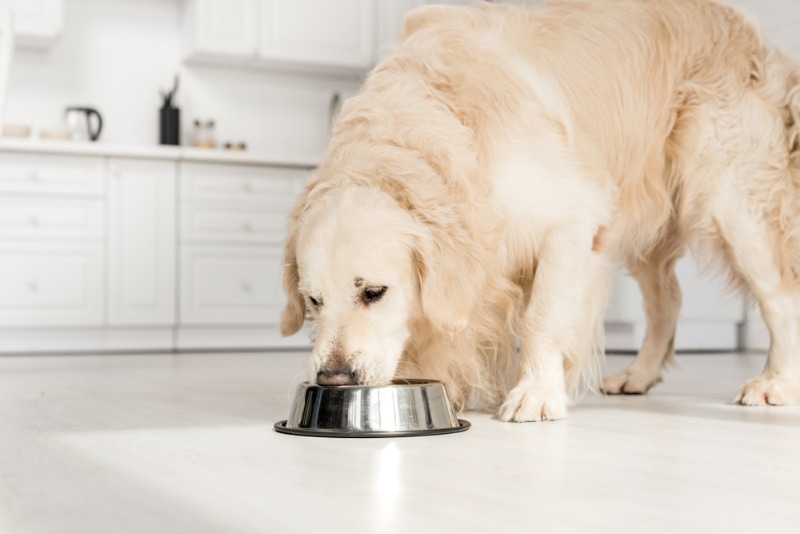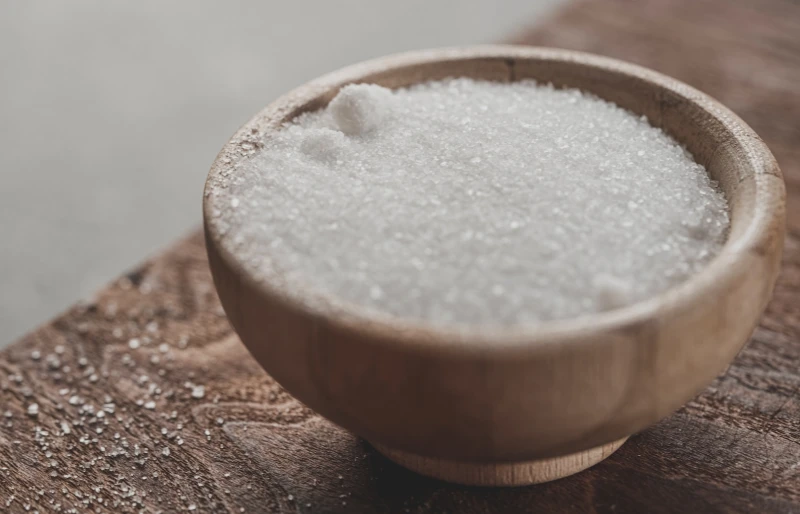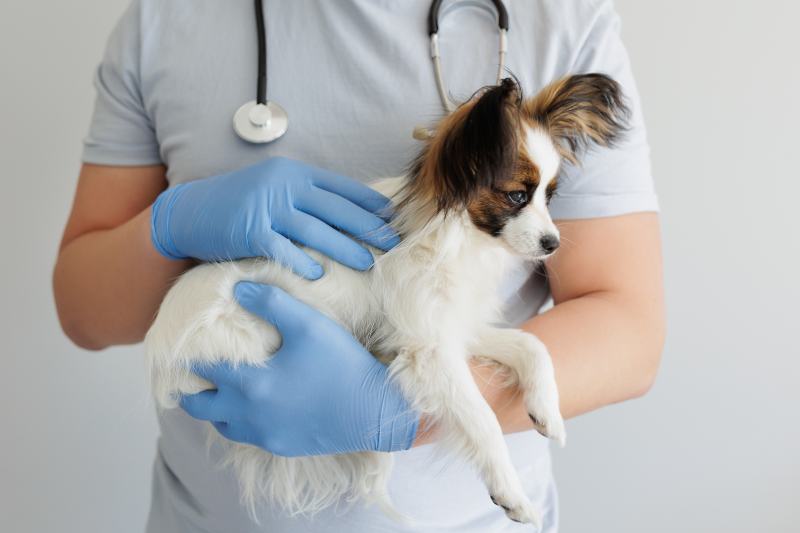Click to Skip Ahead
Most pet parents love to spoil their furry friends with all kinds of treats, so if you and your family are eating tasty marshmallows, you’ll likely be tempted to give one to your dog.
But would that be a good decision? Can dogs eat marshmallows?
The short answer is yes, dogs can technically eat most marshmallows. However, as sweet and tasty as these treats can be, they are not the best for canines.
In this article, we talk about dogs and their eating habits, including the possible dangers of canines eating marshmallows.
What Should a Healthy Dog Diet Look Like?

A healthy and complete dog diet must include proteins, carbohydrates, fats, minerals, and vitamins. Each of these nutrients is crucial for your dog’s optimum health. Although believed to be strict carnivores, dogs have an omnivorous nature, and most canines’ bodies and teeth have adapted to such a diet.
That said, your dog’s diet can include both animal and plant material, so you can meet your dog’s nutritional needs by mixing these foods. The most important thing is that all ingredients are high quality and easily digestible so your furry friend will grow healthy and thrive.
The Ingredients of Marshmallows
Here is a list of the main ingredients that go into making marshmallows, along with their effect on dogs.
Sugar
The main ingredient of marshmallows is sugar. Sugar is not toxic to canines, but it can be harmful to their health if ingested in large amounts. That said, if your dog takes a bite of something sweet every now and then, nothing bad should happen. If they happen to eat a large amount of sugary sweets, they may end up with some digestive upset, mainly vomiting and diarrhea.
But consuming too much sugar over a long period could result in your dog gaining weight, becoming obese, and experiencing various health problems, from diabetes to pancreatitis.
Depending on the manufacturer, sugar-free marshmallows can also contain artificial sweeteners like xylitol. Xylitol is poisonous for dogs, which is why you need to be extremely careful to avoid feeding your dog any food that contains this ingredient.

Corn Syrup
Corn syrup is basically another type of sweetener made from corn starch and other sugars. It tastes great because of the high sugar content, but can do the same things to dogs that sugar does. Digestive upset, weight gain and diabetes can all result from eating lots of foods containing corn syrup.
Gelatin
The last main ingredient of marshmallows is gelatin. This is not generally bad for dogs and can even be considered healthy in small amounts. However, when it’s mixed with corn syrup and sugar, any benefits are lost.

Should Dogs Eat Marshmallows? Are They Safe for Dogs?
Although the ingredients of marshmallows are not toxic to dogs, most are not beneficial to them, so it’s best to avoid feeding them to your dog. That said, your furry companion should be fine if they have a bite or two of a marshmallow. However, eating marshmallows frequently and in large quantities could lead to multiple health problems.
Also, many marshmallow producers use xylitol as an artificial sweetener, especially in sugar-free products. Dogs that consume xylitol could easily experience poisoning, which can cause severe medical problems.
Marshmallows provide no nutritional value for dogs and are high in calories. Basically, just because dogs can eat marshmallows, that doesn’t mean this human treat is safe for them, and it’s best to choose healthy dog-appropriate treats instead.
Possible Dangers of Feeding Marshmallows to Your Dog
1. Xylitol Poisoning
Dogs that eat marshmallows could experience xylitol poisoning, as this is a common ingredient in many sweets, especially those that are supposed to be sugar free. This sugar substitute is toxic to dogs and can lead to severe poisoning, causing signs like:
- Weakness and lethargy
- Lack of appetite
- Low blood sugar
- Vomiting
- Diarrhea
- Lack of coordination
- Difficulty standing/walking
- Tremors
- Seizures
- Liver failure
- Coma
This problem in dogs requires quick and aggressive treatment because it could have fatal effects.

2. Weight Gain/Obesity/Diabetes
Since marshmallows contain high levels of sugar and plenty of calories, they could easily lead to your dog gaining weight and becoming obese. If that happens, your dog is at much higher risk of other weight-related health problems like diabetes and joint disease.
It’s also common for obese dogs to become less active, lethargic, and move or play less than usual, as their overall quality of life is affected by their weight.
3. Choking
Marshmallows are chewy and sticky, which can make it hard for dogs to chew them properly, meaning dogs could easily choke on them unless given small bite-sized pieces. This problem is particularly dangerous for dogs of small breeds.

Frequently Asked Questions
What Should I Do If My Dog Eats Marshmallows?
If your dog eats one or two plain marshmallows that don’t contain xylitol, nothing bad should happen; your furry companion might experience stomach upset, but nothing severe.
However, if your dog eats an excessive number of marshmallows, especially those that contain xylitol or other ingredients, such as chocolate, your dog might be at risk of poisoning.
Therefore, it’s important to monitor your dog after the incident and check to see if the marshmallows contain any toxic ingredients. If your dog experiences signs like vomiting, diarrhea, lethargy, or a lack of appetite, it would be best to take your furry companion to the vet.
In some cases, such as with marshmallows containing xylitol, dogs require quick treatment to prevent further complications, which is why some veterinarians might need to induce vomiting to get the marshmallows out of your dog’s system.
PangoVet. It’s an online service where you can <b>talk to a vet online</b> and get the personalized advice you need for your pet — all at an affordable price!
</p>
<div class="su-button-center"><a href=https://www.dogster.com/dog-nutrition/"https://pangovet.com/?utm_source=dogster&utm_medium=article&utm_campaign=dog_eat_drink%22 class="su-button su-button-style-default" style="color:#FFFFFF;background-color:#FF6600;border-color:#cc5200;border-radius:9px;-moz-border-radius:9px;-webkit-border-radius:9px" target="_blank" rel="nofollow"><span style="color:#FFFFFF;padding:0px 24px;font-size:18px;line-height:36px;border-color:#ff944d;border-radius:9px;-moz-border-radius:9px;-webkit-border-radius:9px;text-shadow:none;-moz-text-shadow:none;-webkit-text-shadow:none"> Click to Speak With a Vet</span></a></div></div></div>"}" data-sheets-userformat="{"2":513,"3":{"1":0},"12":0}"> If you need to speak with a vet but can’t get to one, head over to PangoVet. It’s an online service where you can talk to a vet online and get the personalized advice you need for your pet — all at an affordable price!

Which Sweet Treats Can You Feed Your Dog Instead of Marshmallows?
If your dog likes a sweet dessert every now and then, you should offer other, healthier dog treats instead of marshmallows, such as fruits. Here’s a list of the best non-toxic fruits that your dogs can safely eat:
- Bananas
- Apples
- Raspberries
- Cantaloupe
- Honeydew
- Blackberries
- Watermelon
- Blueberries
- Strawberries
These fruits are safer and more appropriate dog treats, and besides being sweet, they are packed with vitamins and minerals that will boost your dog’s health.
Several dog food manufacturers produce marshmallows strictly made for dogs, so if your canine is a fan, you can also try those out! Just ask your veterinarian first.

Conclusion
Dogs can technically eat marshmallows, and eating one or two shouldn’t do them any harm unless the marshmallows contain xylitol. However, marshmallows are high in calories and sugar and could cause many health problems in your dog if eaten in excess, which is why it’s best to avoid them overall.
If you’re looking to treat your dog with something sweet yet healthy, go for dog-appropriate fruits that will have a more beneficial effect on your dog’s well-being.
Featured Image Credit: StockSnap, Pixabay











